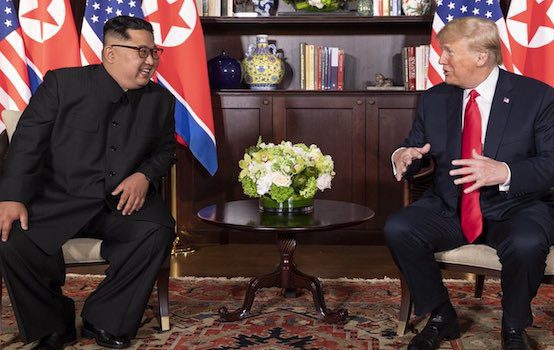The U.S. Needs a More Flexible Approach to North Korea

Van Jackson lays out a blueprint for an arms control approach with North Korea that might have a chance of working. First, the U.S. has to stop fixating on the goal of complete North Korean disarmament:
Because denuclearization is antithetical to Kim Jong Un’s bottom line, U.S. attempts at diplomacy to that end are self-sabotaging. As long as disarmament of North Korea remains America’s professed goal, Kim Jong Un has every incentive either to avoid the negotiating process or favorably manipulate it at America’s expense—by stalling for time, making unfulfilled promises, and securing concessions without reciprocity. Worse, as the 2017 nuclear confrontation showed, making denuclearization an actionable goal of U.S. policy creates real risks of crisis instability—justifying extreme measures and extreme rhetoric in the name of what has become an extreme aim.
But policymakers can avoid the pitfalls of the past by attempting something more realistic than denuclearization—an arms control approach to North Korea. The United States has significant unexploited margin to take diplomatic and political risks aimed at probing and potentially shifting North Korea’s approach to its nuclear arsenal. An arms control approach would seek to reorient U.S. North Korea policy to prioritize what matters most: reducing the risk of nuclear or conventional war without forsaking other U.S. interests at stake in Korea.
Jackson elaborates on what exactly this new approach would involve, and I recommend that everyone read at least the full summary. It is an outline of the kind of realistic engagement that so many of us have been looking for over the last two and a half years. Jackson understands very well that North Korea isn’t going to give up all of its nuclear weapons and missiles, and so the best available option is to negotiate restrictions on the size and deployment of their nuclear arsenal and missile forces. There is still an opening to do this, but the window is rapidly closing. If the North Korean government is serious about their end of 2019 deadline, there isn’t much time left for a new U.S. approach.
Another advantage that this arms control approach would have is that it would help to revive inter-Korean rapprochement that has stalled ever since the collapse of the Hanoi summit. Alex Ward recently spoke with Moon Chung-in, a close adviser to South Korean President Moon, and he found that South Korea is not pleased with the administration’s maximalist, inflexible position because it interferes with their own engagement policy:
The nuclear situation therefore remains at a standstill, and that’s at a minimum delayed any prospects for better inter-Korean ties. Some close to the government are upset about that.
“For the sake of improved US-South Korea relations, we in fact sacrificed North Korea-South Korea relations,” Moon Chung-in, a senior adviser to President Moon, told me (though he was adamant to note he wasn’t speaking for the government). “South Korean government officials got to be really frustrated” and “North Korea is now really angry.”
“The US position has been really harmful” to South Korea’s efforts, he added.
There has been a common misconception that the Trump administration’s pseudo-engagement with North Korea has something to do with promoting peace, but in practice the administration’s unrealistic demands on denuclearization have become obstacles to resolving other issues and they have prevented sanctions relief that would allow South Korea and North Korea to make progress in improving their relations. South Korea’s government is the only one that has made any real diplomatic progress with North Korea, but they are constrained by U.S. sanctions from going further. South Korea has been watching its chance at rapprochement wither away while the U.S. refuses to budge an inch, and North Korea has grown impatient as it waits for some sign that the U.S. is willing to compromise.
Unfortunately, the Trump administration seems allergic to sanctions relief, and both the president and the Secretary of State have a bankrupt all-or-nothing understanding of negotiations. As long as the president thinks that pressure will force North Korea to yield, U.S. policy towards North Korea will remain as hopeless as ever. If Trump doesn’t want his North Korea policy to be a failure, he needs to adopt a more flexible approach right now and give up on the fantasy of a “big deal.”
Comments